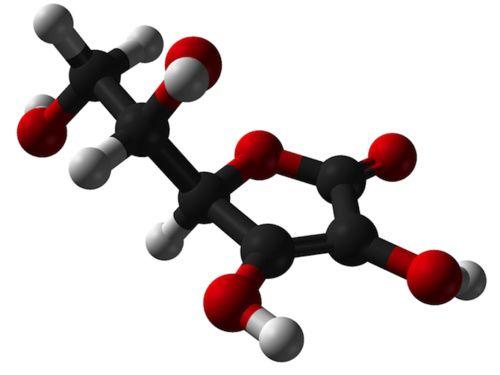Ascorbic acid, or ascorbate, is synonymous with the Vitamin C, a term used as a generic descriptor for all compounds capable of preventing or treating scurvy. The predominant form of the vitamin in tissues and foods is ascorbate. Dehydro-ascorbic acid is another compound with vitamin activity, but its concentration in tissues and food is very low. Let's find out better.
> What is ascorbic acid used for
> Foods that contain it
> Contraindications of ascorbic acid
3D structure of the ascorbic acid molecule

What is ascorbic acid used for
It performs important functions and in particular increases the immune defenses and helps the body to defend itself from viral attacks. It intervenes in the metabolism of iron and in the metabolisms connected to it such as the synthesis of connective tissue, the metabolism of tyrosine (amino acid precursor of various hormones) and the synthesis of carnitine (another nutraceutical).
It also participates, with the metabolism of copper, in the synthesis of catecholamines (adrenaline and noradrenaline, the hormones produced by the adrenal glands) and of peptide hormones (oxytocin, vasopressin, cholecystokinin). It takes part in the healing of wounds, is an adjuvant against anemia and is important for growth as it strengthens bones and teeth.
A marginal vitamin C deficiency is associated with reduced biochemical functions without clinical signs still appearing, in fact the classic symptoms of scurvy can only occur in the state of clinical deficiency.
The recommended daily intake levels are 60mg / 80mg.
Where is ascorbic acid found
Ascorbic acid is found in citrus fruits, kiwis, tomatoes, peppers, cabbage, green vegetables and more generally in fresh fruit and vegetables. Concentrations may vary in relation to the variety, ripening, timing and methods of storage after harvest. When foods are stored or cooked there is a rapid oxidation of the ascorbate, steaming is preferable to preserve the vitamin.
You can learn more about all the foods that contain vitamin C

Controindicazioni
In case of administration of excessive doses of vitamin C there is the possibility of formation of oxalate stones in the urinary tract, the excessive absorption of iron by some subjects and a negative interaction with the absorption of vitamin B₁₂.
READ MORE
The properties and use of karkadè, rich in ascorbic acid
Other articles on ascorbic acid:
> Where is vitamin C found
| Wikipedia


























